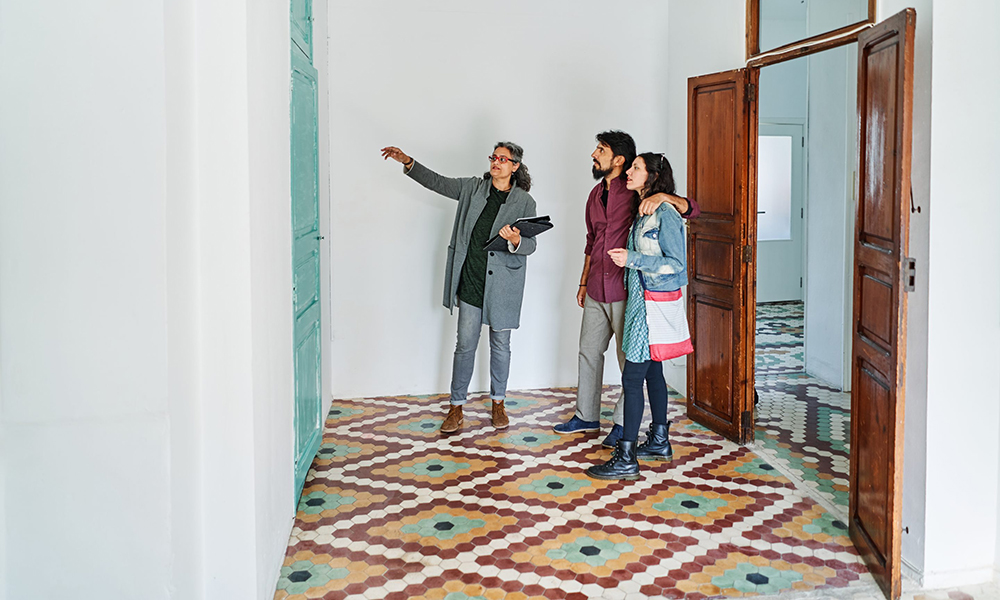
在当前房地产市场行情下,美国银行(Bank of America)的经济学家围绕“买房还是租房”这一永恒的争论,陷入了一种莎士比亚式的情绪。该银行最近发布了一份研究报告,标题为“买房还是租房?这是个问题”,颇具《哈姆雷特》风格。美国银行的经济学家认为,购房,用哈姆雷特的话来说,在如今是命运的一种不幸。
房贷利率已经给购房者带来了一系列问题。利率一度升至之前难以想象的8%,之后由于通胀报告低于预期和美联储加息周期可能结束的预期,利率出现了数周下跌。经济学家引用密歇根大学消费者信心调查的数据表示,尽管从可负担性角度看利率下跌更为有利,但房价在仅仅三年时间内仍大幅上涨,消费者认为现在不是购房的好时机。经济学家还建议购房者要预见长期处于较高水平的利率环境(与其他投资银行的说法相呼应)。
同时,租金也出现了大幅上涨。只是由于最近租赁市场趋缓,租金增长才有所减缓。经济学家在报告中写道:“由于房子可负担性低,显然这并不是一个买家市场,但租赁市场的情况也没有好到哪里去。”
“除两个城市之外,大部分城市的租金依然比房贷更低”
美国银行的经济学家对租与买的难题进行了研究,对租金支付和按揭贷款偿还进行了比较(他们的计算涵盖了房产税,不包括房屋保险、水电费和维护费用)。自疫情爆发以来,租金和房贷相对于中位数收入来说都变得更高,但尽管如此,经济学家通过分析发现,截至十月份,“在97个主要城市中,除了两个城市以外,支付租金仍然比偿还抵押贷款更划算。”这种情况并不难理解。受到疫情影响,数百万人有可能希望追求一种不同的生活方式,以及不同的住房条件,这导致全国范围内的房价上涨超过40%,同时推动了租金的迅速上涨,而购房市场的回暖速度则相对较慢。
这就是问题所在:在一些地方,情况比其他地方更糟。经济学家发现,沿西海岸的洛杉矶等城市购房比租房成本更高。从房贷和租金在中位数收入中的占比来看,在洛杉矶,房贷和税占83%,而租金占41%;在圣何塞,房贷和税占80%,而租金占26%;在旧金山,房贷和税占71%,而租金占29%;在圣地亚哥,房贷和税占74%,而租金占38%;在西雅图,房贷和税占55%,而租金占25%。
还有一些城市,比如纽约,购房和租房费用在中位数收入中的占比为62%和43%。与此同时,根据经济学家的分析,新奥尔良和密西西比州的杰克逊是仅有的两个购房成本低于租房成本的城市。
房地产网站Realtor.com在十月底发布的最新租赁报告显示,租金已经连续下降五个月。Realtor.com的首席经济学家丹妮尔·哈尔在一份声明中表示,“在几乎所有主要市场,租房比购房更经济实惠。“此前的一份报告显示,购买入门级住房的成本,如果按月计算,明显高于租赁类似大小的住房的成本。在前50个主要城市中,有47个都是如此。
资产净值问题
但是接着,美国银行的观点又转到了资产净值的问题上:如果你购买一套房屋,随着时间的推移,你会拥有房屋资产净值,与此同时,你的房屋也在增值。这样,这套房子就变成了一种可以利用的现金储备。尽管租房并不具备这些优势,但这并不意味着租房不是一种可行的选择,特别是在当前这个时刻。
美国银行经济学家写道:“美国整体情况也是类似的。尽管租房和购房的成本都在增加,但租房更容易负担得起。在全国范围内,租金在美国家庭中位数收入中的占比从23%增加到26%,而房贷的占比则从19%增长到32%。“
数据表明,住房市场给普通购房者带来的负担比疫情前变得“更加沉重”,可能需要一些时间才能达到供需平衡。美国银行预计美联储会在明年降息。之后,他们写道,随着供需关系的改善,与住房相关的各种活动应该会有所回升。根据经济学家的预计,存量房屋销售(目前处于十多年来的最低速度)和新房销售都将在明年下半年“回暖”,同时加强建设以支持新建住房项目开工。换言之,美国银行是在违背良心下赌注,意在让我们所有人都变成(住房)懦夫,使人们对参与和住房有关的活动感到担忧和恐惧。(财富中文网)
译者:郝秀
审校:汪皓
在当前房地产市场行情下,美国银行(Bank of America)的经济学家围绕“买房还是租房”这一永恒的争论,陷入了一种莎士比亚式的情绪。该银行最近发布了一份研究报告,标题为“买房还是租房?这是个问题”,颇具《哈姆雷特》风格。美国银行的经济学家认为,购房,用哈姆雷特的话来说,在如今是命运的一种不幸。
房贷利率已经给购房者带来了一系列问题。利率一度升至之前难以想象的8%,之后由于通胀报告低于预期和美联储加息周期可能结束的预期,利率出现了数周下跌。经济学家引用密歇根大学消费者信心调查的数据表示,尽管从可负担性角度看利率下跌更为有利,但房价在仅仅三年时间内仍大幅上涨,消费者认为现在不是购房的好时机。经济学家还建议购房者要预见长期处于较高水平的利率环境(与其他投资银行的说法相呼应)。
同时,租金也出现了大幅上涨。只是由于最近租赁市场趋缓,租金增长才有所减缓。经济学家在报告中写道:“由于房子可负担性低,显然这并不是一个买家市场,但租赁市场的情况也没有好到哪里去。”
“除两个城市之外,大部分城市的租金依然比房贷更低”
美国银行的经济学家对租与买的难题进行了研究,对租金支付和按揭贷款偿还进行了比较(他们的计算涵盖了房产税,不包括房屋保险、水电费和维护费用)。自疫情爆发以来,租金和房贷相对于中位数收入来说都变得更高,但尽管如此,经济学家通过分析发现,截至十月份,“在97个主要城市中,除了两个城市以外,支付租金仍然比偿还抵押贷款更划算。”这种情况并不难理解。受到疫情影响,数百万人有可能希望追求一种不同的生活方式,以及不同的住房条件,这导致全国范围内的房价上涨超过40%,同时推动了租金的迅速上涨,而购房市场的回暖速度则相对较慢。
这就是问题所在:在一些地方,情况比其他地方更糟。经济学家发现,沿西海岸的洛杉矶等城市购房比租房成本更高。从房贷和租金在中位数收入中的占比来看,在洛杉矶,房贷和税占83%,而租金占41%;在圣何塞,房贷和税占80%,而租金占26%;在旧金山,房贷和税占71%,而租金占29%;在圣地亚哥,房贷和税占74%,而租金占38%;在西雅图,房贷和税占55%,而租金占25%。
还有一些城市,比如纽约,购房和租房费用在中位数收入中的占比为62%和43%。与此同时,根据经济学家的分析,新奥尔良和密西西比州的杰克逊是仅有的两个购房成本低于租房成本的城市。
房地产网站Realtor.com在十月底发布的最新租赁报告显示,租金已经连续下降五个月。Realtor.com的首席经济学家丹妮尔·哈尔在一份声明中表示,“在几乎所有主要市场,租房比购房更经济实惠。“此前的一份报告显示,购买入门级住房的成本,如果按月计算,明显高于租赁类似大小的住房的成本。在前50个主要城市中,有47个都是如此。
资产净值问题
但是接着,美国银行的观点又转到了资产净值的问题上:如果你购买一套房屋,随着时间的推移,你会拥有房屋资产净值,与此同时,你的房屋也在增值。这样,这套房子就变成了一种可以利用的现金储备。尽管租房并不具备这些优势,但这并不意味着租房不是一种可行的选择,特别是在当前这个时刻。
美国银行经济学家写道:“美国整体情况也是类似的。尽管租房和购房的成本都在增加,但租房更容易负担得起。在全国范围内,租金在美国家庭中位数收入中的占比从23%增加到26%,而房贷的占比则从19%增长到32%。“
数据表明,住房市场给普通购房者带来的负担比疫情前变得“更加沉重”,可能需要一些时间才能达到供需平衡。美国银行预计美联储会在明年降息。之后,他们写道,随着供需关系的改善,与住房相关的各种活动应该会有所回升。根据经济学家的预计,存量房屋销售(目前处于十多年来的最低速度)和新房销售都将在明年下半年“回暖”,同时加强建设以支持新建住房项目开工。换言之,美国银行是在违背良心下赌注,意在让我们所有人都变成(住房)懦夫,使人们对参与和住房有关的活动感到担忧和恐惧。(财富中文网)
译者:郝秀
审校:汪皓
This housing market has Bank of America economists in a Shakespearean mood about the eternal debate: The slings and arrows of buying versus renting. In a recently released Hamlet-esque research note, “To buy or not to buy, that is the question,” BofA economists found that buying, to paraphrase the prince of Denmark, is an outrageous fortune these days.
Mortgage rates have created a sea of troubles for homebuyers, hitting the once-unthinkable 8% mark before falling for weeks in the wake of cooler-than-expected inflation reports and the prospect of an end to the Federal Reserve’s rate hiking cycle. While that’s nobler in the mind in terms of affordability, home prices have still risen substantially in just three years, and consumers don’t think it’s a good time to buy, the economists said, citing a University of Michigan consumer sentiment survey. The economists also suggested that buyers should anticipate the undiscovered country of a higher-for-longer rate environment (echoing other investment banks who have said as much.)
At the same time, rents have gone up substantially as well—only recently has rent growth slowed as the rental market softens. “It clearly has not been a buyers’ market due to low affordability, but the situation has not been all that much better in the rental market,” they wrote in the note.
‘Rent was still cheaper than mortgages in all but two’
The BofA economists took a look at the rent versus buy conundrum, comparing rent and mortgage payments (they included property taxes in their calculation, but excluded home insurance, utilities and maintenance costs). Nonetheless, their analysis found that “rent was still cheaper than mortgages in all but two of 97 major Metro Areas,” as of October, despite the fact that both rents and mortgage payments have gotten more expensive, relative to median income, since the pandemic. It’s not hard to understand this, given that the whips and scorns of the pandemic let millions perchance dream of a different way of life—and a different housing situation, sending home prices up more than 40% nationwide and fueling a rent spike that has settled down faster than the buying market.
There’s the rub: It’s worse in some places than others. Along the west coast, economists found it more expensive to purchase a home than rent in cities like Los Angeles, where as a percentage of median income, mortgage payments and tax are 83% and rent is 41%; or San Jose, where it’s 80% versus 26%; or San Francisco, where it’s 71% versus 29%; or San Diego, where it’s 74% versus 38%; or Seattle, where it’s 55% versus 25%.
But there’s also cities like New York, where it’s 62% versus 43%. Meanwhile, New Orleans and Jackson, Mississippi, are the only two cities that are less expensive to buy than rent, according to their analysis.
Realtor.com’s recent rental report, published in late-October, found that for the fifth straight month, rents dropped. “It’s become more economical to rent than to buy in nearly all major markets,” Danielle Hale, chief economist at Realtor.com, said in a statement, at the time. An earlier report showed the cost of buying a starter home was significantly more expensive on a month-to-month basis than the cost of renting a similar-size home; that was true in 47 of the top 50 metros.
The equity question
But then BofA’s pale cast of thought turns to the question of equity. When you buy a home, you build equity over time, all the while the value of your home appreciates. Your home becomes a sort of cash reserve into which you can tap. None of that is true for renting, but that doesn’t mean it’s not a viable option, particularly at this moment.
“A similar story applies to the United States as a whole,” they wrote. “Despite the costs of renting and homeownership both increasing, renting is more affordable than owning. On a national basis, rents have increased from 23% to 26% of median U.S. household income, while the ratio of mortgage payments to income has grown from 19% to 32%.”
The data suggests a housing market that has become “more burdensome” on the average buyer than pre-pandemic—one that’ll take some time before achieving a balance between supply and demand. The investment bank expects the Fed to cut rates next year, and after, they wrote, housing activity should pick up amid improved demand and supply. That being said, the economists expect both existing home sales (which are at their slowest pace in over a decade) and new home sales to “warm up” in the second half of next year, along with more building to support housing starts. In other words, BofA is betting against conscience making (housing) cowards of us all.






